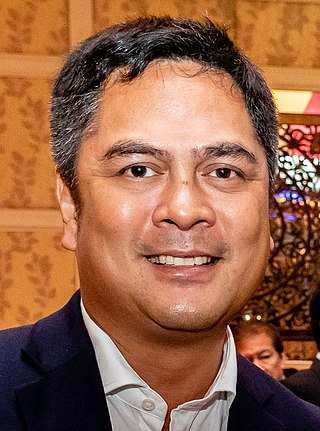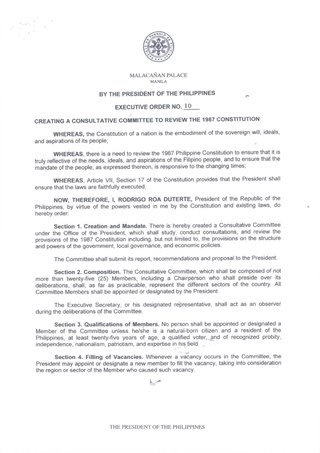Related Research Articles

In the Philippines, regions are administrative divisions that primarily serve to coordinate planning and organize national government services across multiple local government units (LGUs). Most national government offices provide services through their regional branches instead of having direct provincial or city offices. Regional offices are usually but not necessarily located in the city designated as the regional center.

The Department of Trade and Industry is the executive department of the Philippine government responsible for the advancement, promotion, governance, regulation, management and growth of industry and trade.

This article covers the history of the current Philippine republican state following the 1986 People Power Revolution, known as the Fifth Philippine Republic.

The National Economic and Development Authority is an independent cabinet-level agency of the Philippine government responsible for economic development and planning. It is headed by the president of the Philippines as chairman of the NEDA board, with the Secretary of Socioeconomic Planning as vice-chairman. A number of Cabinet members, the Governor of the Bangko Sentral ng Pilipinas, the Chairperson of the Metropolitan Manila Development Authority, the Chief Minister of Bangsamoro, the Secretary of Information and Communications Technology, the Chairman of the Subic–Clark Area Development Corporation, and the National President of the Union of Local Authorities of the Philippines are members of the NEDA Board.

Rodrigo Roa Duterte, also known as Digong, Rody, and by the initials DU30 and PRRD, is a Filipino lawyer and politician who served as the 16th president of the Philippines from 2016 to 2022. He is the chairperson of Partido Demokratiko Pilipino, the ruling political party in the Philippines during his presidency. Duterte is the first president of the Philippines to be from Mindanao, and is the oldest person to assume office, beginning his term at age 71.

The Philippine Coconut Authority is an agency of the Philippine government under the Department of Agriculture responsible for developing the coconut and other palm oil industry to its full potential in line with the new vision of a united, globally competitive and efficient industry.

Jose Ruperto Martin Marfori Andanar is a Filipino television news personality, former news anchor, radio commentator, podcaster, voice-over artist and a columnist. He served as the former secretary of the Presidential Communications Office of the Philippines under the Duterte administration and is now CGTN anchor.

In 2021, official government statistics reported that the Philippines had a poverty rate of 18.1%,, significantly lower than the 49.2 percent recorded in 1985 through years of government poverty reduction efforts. From 2018 to 2021, an estimated 2.3 million Filipinos fell into poverty amid the economic recession caused by the COVID-19 pandemic.

The Office of the President of the Philippines, is an administrative, advisory, and consultative government agency that aids the president of the Philippines in performing their duty as head of state and chief of the executive branch of government.

Arsenio Molina Balisacan is a Filipino economist and academician currently serving as the Secretary of the National Economic and Development Authority (NEDA). Balisacan first served as the NEDA Secretary from May 2012 to January 2016 under the Benigno Aquino III administration. He then served under the Duterte administration as the Chairperson of the Philippine Competition Commission from February 1, 2016, to June 30, 2022. He was again appointed as NEDA Secretary under the Bongbong Marcos administration. During his first term in 2012, he concurrently served as NEDA Secretary and as Chairman of the Boards of the Philippine Statistics Authority, Philippine Institute for Development Studies, Philippine Center for Economic Development, and Public-Private Partnership Center.
The following are the events in related to Philippine law in 2016. This includes developments in criminal investigations of national notability.

The Cabinet Secretariat, formerly the Office of the Cabinet Secretary, was a member agency of the Cabinet of the Philippines which provided support to the President, facilitated the exchange of information, as well as discussed and resolved issues among Cabinet members. The Cabinet Secretary also acted as a coordinator and integrator of the initiatives of the President. The Cabinet Secretariat was created through Executive Order No. 237, s. 1987.

Rodrigo Duterte's six-year tenure as the 16th President of the Philippines began on June 30, 2016, succeeding Benigno Aquino III. He was the first president from Mindanao, the first president to have worked in all three branches of government, and the oldest to be elected. He won the election amid growing frustration with post-EDSA governance that favored elites over ordinary Filipinos. His tenure ended on June 30, 2022.

Executive Order No. 10 was signed on December 7, 2016, by Philippine President Rodrigo Duterte which created a consultative committee to review the 1987 Constitution of the Philippines. The move officially set in motion the process for amending the 30-year-old charter and set up a federal system of government in the Philippines aimed at ending the Moro conflict and further opening up of the Philippine economy.
DuterteNomics is a catch-all term referring to the socioeconomic policies of Rodrigo Duterte, the 16th president of the Philippines. A significant part of these policies include the development of infrastructure and industries in the Philippines.

Vivencio "Vince" Bringas Dizon is a Filipino economist, consultant and political aide who previously served as president and CEO of the Bases Conversion and Development Authority. He also served as President Rodrigo Duterte's Adviser on Flagship Programs and Projects and as Deputy Chief Implementer of the National Action Plan Against COVID-19.

The Build! Build! Build! Infrastructure Program (BBB) was the infrastructure program of the administration of Rodrigo Duterte, the 16th president of the Philippines. A key component of his socioeconomic policy, the program aimed to reduce poverty, encourage economic growth and reduce congestion in Metro Manila, and address the country's infrastructure gap. Launched on April 18, 2017, the program also included the continuation of 44 infrastructure projects under previous administrations.
The first 100 days of Rodrigo Duterte's presidency began on June 30, 2016, the day Rodrigo Duterte was inaugurated as the 16th president of the Philippines. The concept of the first 100 days of a presidential term was first adopted in the Philippines by President Corazon Aquino from the United States and has since been used as a gauge of presidential success and activism, and is a considered the "honeymoon period" where traditional critics are urged to refrain from detracting the new president. The 100th day of his presidency ended at noon on October 8, 2016.
References
- ↑ "About AmBisyon Natin 2040". National Economic and Development Authority website. Retrieved May 2, 2020.
- ↑ Foreword, Preface, and Chapter 1 of R. Clarete, E. Esguerra, and H. Hill, 2018, The Philippine Economy: No Longer the East Asian Exception?, Singapore: Institute of Southeast Asian Studie
- ↑ "FAQs – AmBisyon Natin 2040". National Economic and Development Authority website. Retrieved May 2, 2020.
- ↑ "Executive Order No. 5, s. 2016". Official Gazette of the Republic of the Philippines. October 11, 2016.